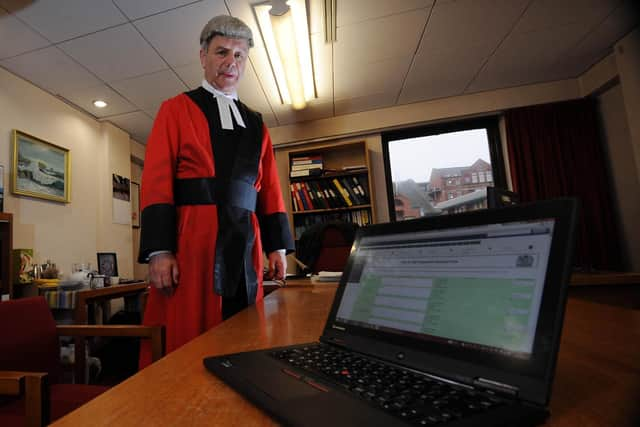'It is completely unacceptable': Leeds' former top judge Peter Collier QC says victims are being denied justice as trial waiting times triple due to Covid-19 and historic Government cuts
and live on Freeview channel 276
His Hon Peter Collier QC described how a decade of chronic Government cuts and under investment has led to a situation where many victims of crime are being denied justice.
Mr Collier said the typical waiting time for a trial in cases where a defendant is on bail has almost TRIPLED since he was first appointed as the city's presiding judge.
Advertisement
Hide AdAdvertisement
Hide AdThe former Recorder of Leeds retired from his role at the helm of the third busiest Crown court in England and Wales in 2018.


Mr Collier said that during his decade-long tenure the court faced a constant battle coping with a reduction in resources.
According to the latest Ministry of Justice figures, the criminal courts backlog stood nationally at 457,518, as of November.
There were 53,950 cases outstanding in the Crown courts and 403,568 outstanding in the magistrates' courts.
Advertisement
Hide AdAdvertisement
Hide AdMr Collier told: "The real problem is not the number of cases in a backlog but the length of time it takes from a case arriving and it being dealt with.


"It is that that has increased significantly and it began to increase while I was at Leeds."
Outlining the problem, Mr Collier said how the typical length of time it now takes for a serious sex case to be tried by a jury after it first arrives in the Crown court has increased from five to 14 months during the past 13 years.
Mr Collier said in 2008 the typical waiting time for a five-day rape trial in Leeds was around five months.
By 2010, the waiting time had slipped to six months.


Advertisement
Hide AdAdvertisement
Hide AdIn 2014 it had increased to nine months and by 2015 it was an 11-month wait.
Since the beginning of this year, defendants on bail awaiting trial by jury are having cases listed at Leeds Crown Court for the spring of 2022.
Explaining the background to the problem Mr Collier said: "There are a number of things contributing to that.
"First of all we knew that we were getting more of that kind of serious sexual assault case.
"This followed the Jimmy Savile exposure in 2012.
Advertisement
Hide AdAdvertisement
Hide Ad"So suddenly from 2012 and 2013 people started to come forward.
"Obviously it took time to investigate and the additional number of cases started hitting our system by 2014.
"So we had more cases to try but at the same time they were reducing the number of our sitting days."
Mr Collier said the number of judges' sitting days in Leeds was 2,779 in 2010.
Advertisement
Hide AdAdvertisement
Hide AdBy 2012 the figure was down to 2,318 before rising slightly to 2,500 in 2015.
Mr Collier explained: "So they cut the sitting days, we were getting more cases that were going to need trials and they were not giving us more days but fewer days.
"So obviously, the time within which you can try them in goes further and further back."
In 2010 the backlog stood at 30 per cent of cases then coming into the criminal courts
It now stands at around 36 per cent.
Advertisement
Hide AdAdvertisement
Hide Ad"But just to throw figures around doesn't take account of the variation from year to year.
"Caseloads go up and down. Overall there is no rhyme and reason as to what causes them to go up and down because there are so many other players in the system.
"There is the police and their resources and their particular targets and figures and so on, the Crown Prosecution Service (CPS) are sometimes quicker at dealing with things than at other times.
"So there are all sorts of things that cause variations.
"Once the figures go down in terms of receipts they are very quick to take away your sitting days.
Advertisement
Hide AdAdvertisement
Hide Ad"But they are very slow to give you back your sitting days or to increase them when the numbers go up.
"The thing that really matters is; a case comes in today, when are we going to be able to try it?"
Describing the waiting time faced by many for jury trials, Mr Collier said: "It is completely unacceptable.
"During my time, by the time we got up to 10 and 11 months people were increasingly disengaging.
Advertisement
Hide AdAdvertisement
Hide Ad"I was having to deal with applications for witness summonses because people were telling the police who knocked on their door: 'I'm not interested any more'.
"Even for those who are engaged, memories fade and sometimes you lose track of where a witness has gone.
"Defendants are less likely to enter guilty pleas.
"Those are the real problems caused and it is because they don't pay enough money to fund enough courtrooms."
Mr Collier said he believed there is already enough capacity within the courts system to deal with the crisis.
Advertisement
Hide AdAdvertisement
Hide AdHe said: "There are courtrooms in existing buildings that have not been used for years
"We have been talking about Nightingale courtrooms but a lot of it is simply about just unlocking the doors of the courtrooms we have already got
"But that is just more money to spend and that is not what they are prepared to do.
"You have got to make a serious effort to bring cases forward. You have got to try cases, including bail cases, within a few months."
Advertisement
Hide AdAdvertisement
Hide AdA Ministry of Justice spokesperson said: “We’re investing £450m to speed up justice and this is already having an impact - the magistrates‘ backlog is falling significantly and the number of cases being dealt with in the Crown Courts reached pre-pandemic levels in December."